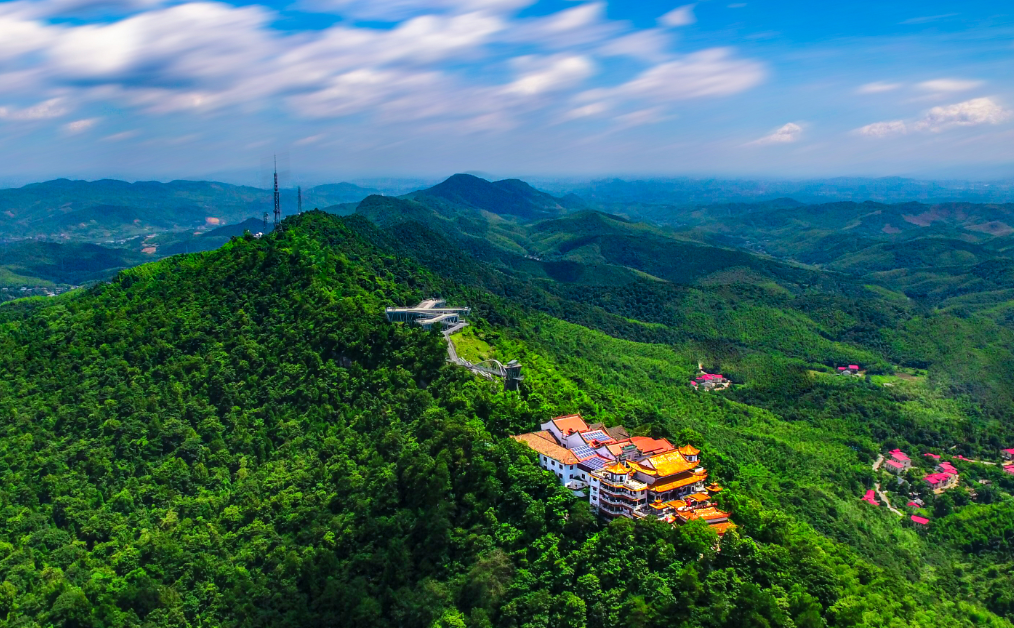苏仙岭简介
苏仙岭景区位于湖南省郴州市中心城区,距武广高铁(郴州西站)8公里,107国道5公里,京广铁路(郴州火车站)1公里、京港澳高速2公里,交通十分便利。它独屹于郴江边,山势秀丽,万木葱茏,自古享有"天下第十八福地”、“湘南胜地”的美誉,现为国家级风景名胜区、国家AAAA级旅游景区、全国重点文物保护单位、国家生态文明教育基地、全国优秀全民健身活动站、全国群众体育先进单位、湖南省新潇湘八景。
景区历史悠久,人文资源独特,文化底蕴深厚,其苏仙传说、九仙二佛传说昭示中国古代宗教文化的发源壮大;橘井泉香典故彪炳中华中医文化;苏仙岭"三绝碑”等碑刻题词遗诗辉映唐宋文化精髓。
“山不在高,有仙则名”。苏仙岭原名牛脾山,传说西汉文帝时,郴人苏耽在此修道成仙,苏仙岭因此而得名,距今已有2100多年的历史。
苏仙岭自汉唐以来,为道教活动场所,被誉为“天下第十八福地”。山上古迹、名人遗迹众多,矗立于顶峰的南禅寺(原苏仙观)始建于汉代,古朴典雅,临崖而建;山腰的景星观建筑简朴淡雅,周围竹木葱茏,绿华如盖,环境清幽,韩愈因仰慕其主持廖法正道长写下传世名篇《韩愈送廖道士序》;北宋著名词人秦少游流放郴州期间于郴州旅舍作干古名篇《踏莎行•郴州旅舍》;镌刻于白鹿洞石壁上,由秦少游作词、苏东坡写跋、米芾书写的“三绝碑”被誉为中国十大“三绝碑”之首,曾受到毛泽东主席关注;西安事变后张学良将军幽居苏仙岭,在屈将室留下了“恨天低,大鹏有翅愁难展”的千古遗恨。
古老的历史、迷人的传说、瑰丽的风景,让历代名人骚客留下无数足迹和脍炙人口的词章歌赋。汉《桂阳列仙传》、晋葛洪《神仙传》、北魏郦道元《水经注》、宋《太平广记》、明《徐霞客游记》、清蒲松龄《聊斋志异》、《古诗源》等都有苏仙、橘井的篇章;杜甫、元结、刘禹锡、柳宗元、王昌龄、阮阅等都以苏仙、橘井等为题写下了不朽的诗篇。
Introduction to Suxianling
Suxianling scenic spot is located in the central urban area of Chenzhou, Hunan Province. It is 8km away from Wuhan Guangzhou high-speed railway (Chenzhou west station), 5km away from national highway 107, 1km away from Beijing Guangzhou Railway (Chenzhou railway station) and 2km away from Beijing Hong Kong Macao expressway. The transportation is very convenient. It stands alone by the Chenjiang River, with beautiful mountains and verdant trees. It has enjoyed the reputation of "the 18th blessed land in the world" and "Southern Hunan resort" since ancient times. It is now a national scenic spot, a national AAAA tourist attraction, a national key cultural relics protection unit, a national ecological civilization education base, a national excellent national fitness activity station, a national advanced unit of mass sports, and eight new Xiaoxiang scenic spots in Hunan Province.
The scenic spot has a long history, unique cultural resources and profound cultural heritage. The legend of Su Xian and the legend of nine immortals and two Buddhas show the origin and growth of ancient Chinese religious culture; the allusions of orange well spring shine on Chinese traditional Chinese medicine culture; the inscriptions of Su Xian Ling "three unique Steles" and other poems reflect the essence of Tang and song culture.
"The mountain is not high, there is an immortal, there is a name". Suxian mountain was originally named Niupi mountain. It is said that Su Dan, a Chenese, became an immortal here during the reign of Emperor Wen of the Western Han Dynasty. Hence the name of Suxian mountain, which has a history of more than 2100 years.
Since the Han and Tang Dynasties, Suxianling has been a place for Taoist activities, known as "the 18th blessed place in the world". There are many historic sites and celebrity relics on the mountain. The Nanchan Temple (formerly Suxian Temple) standing at the peak was built in the Han Dynasty, simple and elegant, near the cliff; The scenic star view on the hillside is simple and elegant, surrounded by verdant bamboo and trees, green as a cover, and quiet environment. Han Yu admires the Taoist priest Liao FA, who presided over him, and wrote the famous preface to Taoist Liao sent by Han Yu; Qin Shaoyou, a famous poet of the Northern Song Dynasty, wrote the famous ancient poem "stepping on the sand • Chenzhou hostel" in Chenzhou hostel during his exile in Chenzhou; Engraved on the stone wall of Bailudong, the "three wonders stele" written by Qin Shaoyou, Su Dongpo and Mi Fu is known as the first of China's top ten "three wonders steles" and has attracted the attention of Chairman Mao Zedong; After the Xi'an Incident, general Zhang Xueliang lived in Suxianling in seclusion and left a lasting regret in Qu Jiang's room that "the sky is low and the ROC has wings and is difficult to show".
The ancient history, charming legends and magnificent scenery have left countless footprints and well-known poems and songs for celebrities and poets of all ages. The biography of immortals in Guiyang in Han Dynasty, the biography of immortals in Jin Gehong, the annotation of Shuijing by Li Daoyuan in Northern Wei Dynasty, Taiping Guangji in Song Dynasty, Xu Xiake's travels in Ming Dynasty, strange tales of Liaozhai by Pu Songling in Qing Dynasty and the source of ancient poetry all have chapters of Su Xian and Jujing; Du Fu, Yuan Jie, Liu Yuxi, Liu Zongyuan, Wang Changling and Ruan Yue all wrote immortal poems with Su Xian and Jujing as their titles.






